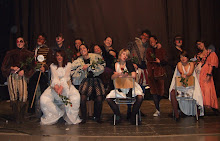BIOGRAPHY
Lorca was born on June 5th 1898 in Fuente Vaqueros, a small village near Granada. Although they were quite a common family, his father (Mr. Federico García) was a respected and prosperous landowner, who decided to move the family into the main city, Granada, in 1909. However, Federico García Lorca wanted people to call him Lorca, which is her mother’s surname.
In 1919 he moved to the famous Residencia de estudiantes in Madrid, to continue his university work. There he met all kind of artists, including Salvador Dalí, with whom he had a relationship. He went to United States in 1929-1930 after a depressive period. He spent his time mostly in New York, where he wrote surrealistic poems and plays.
He went back to Spain, where the re-establishment of the Spanish Republic in 1931 allowed him to fully participate in the cultural life. He became director of La Barraca, a touring theatre company with the aim of bringing classical plays to rural audiences, which otherwise would have been so far away of being able to see this type of theatre. It was with La Barraca that he wrote his three most famous plays: Bodas de sangre (Blood Wedding), Yerma and La casa de Bernarda Alba (The house of Bernarda Alba). It was also with this company that he produced first his “rural” triology plays.
When the civil war started in 1936, he went back to Granada, although he knew it was one of the less secure places he could go: first of all, because of its conservative elite (almost the bigger in the whole Andalucia) and second of all, because he was already quite known.
On 16th August, 1936 he was arrested by the nationalists, tortured and, on 19th August he was shot because of his homosexuality and left-wing position and contacts. Lorca was thrown into an unknown grave somewhere between Víznar and Alfacar, near Granada.
______________
The society of its time, at least in the countryside of Andalucia, was so rural (practically all the economy was based on agriculture) and, in a way, basic. It was far away from the rationalism of the rest of western Europe, and there were still some magic beliefs going on there.
The society of its time, at least in the countryside of Andalucia, was so rural (practically all the economy was based on agriculture) and, in a way, basic. It was far away from the rationalism of the rest of western Europe, and there were still some magic beliefs going on there.
Lorca was really aware of this, and he wanted to preserve it. In fact, lots of people call him as a land poet and land playwriter, confirmed by what he said once: "I love the land. All my emotions tie me to it. The first memories I have are of the earth." And from here we can understand his attempts, during all his life, to keep the culture connected with its roots. These attempts were not only in theatre, as we can perfectly see with the two plays we are studying, but also with music (creating first amateur festival of Andalusian "Cante jundo", in order to protect Andalusian music from commercialization) and poetry (Romancero Gitano [Gipsy Ballads], with the same purpose).
However, he was not the only one who wanted to shake the current conventions of his time. Actually, he was a member of what is called the “Generation of 27”: a group of authors that started their course with firm connections to land and, later on, also used surrealistic techniques. His surrealistic works can be seen with “El Público” (attack to commercial theatre and the social order) and also “Así que pasen cinco años”. Apart from trying to criticize the rationalism in theatre, he also challenged audiences introducing controversial topics such as: homosexuality, class system and role of the women in society.
Due to this kind of rebellion we can perfectly see that he broke the conventions and, furthermore, he did it in two ways. The first one comes, as we commented before, from moving away from the rationalist tendency that provoked the decadence of tragedy, that provoked a high amount of empty comedies that just wanted to please middle class audience. At this point it’s important to note the completely failure of Blood Wedding in New York because, as Lorca similarly said, New York it’s only about money and oneself; how was that society going to understand the blood, mystery, speaking moons and old traditions from our still rural countryside?
The second convention he ignored was the theoretical problems that ancient Greeks set up for tragedies, and that European dramaturges tried to follow. He just wrote, wrote from and for the land, from and for the common people.
There are so many things that can be said about Lorca, but the last important one I want to comment is the double character he had towards the end of his life, due to the celebrity he started to become, that made him keep inside his real character. Perhaps from here we can understand better how the worries about what the others will say, are reflected in most of the characters of his plays.
To sum up, I wanted to quote three things Lorca said that, at the end, are the best material we have to understand him:
http://uwcimtheatreclass.blogspot.com/2008/02/lorca-quotes.html (I already posted them some days ago)
Neus.


No comments:
Post a Comment